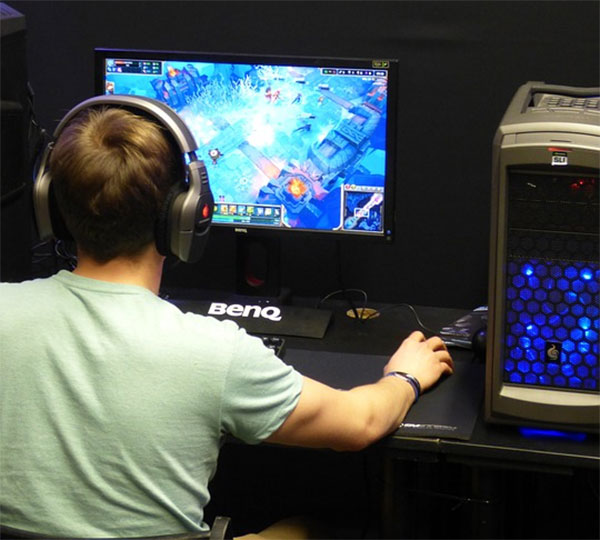
We have reached an interesting point in a society where the children who were first introduced to the idea of having video games in the home are now parents of children who have video game consoles. The number of video game consoles, mobile games, and PC games available today far outpaces anything a child of the late 80's or early 90's could have ever dreamed of.
Parents today face a unique dilemma because many of them love playing video games as much, if not more, than their children. But the question that parents need to ask themselves is, how much is too much where their children are concerned? Some parents worry that their children are addicted to popular online video games and are considering curbing the amount of time their children spend playing these games.
Helpful Guidelines Parents May Wish to Consider
The American Academy of Pediatrics has created guidelines that some parents may wish to consider when determining how much screen time is for their children. According to their guidelines, children who are under 18 months of age should not be put in front of a screen frequently. From age 18 months to 24 months, parents may start to introduce high quality programming and watch it with their children to make sure that the children understand what they see.
Between the ages of two years and five years of age, parents can start to introduce one hour a day of screen time, be it high quality programs or video games. By the time a child is six years of age, parents will have to use their best judgment in determining how long they allow their child to sit in front of the screen playing video games.
Out of concern for their child’s health, parents are not going to allow video games to take the place of things like physical activity, getting sufficient sleep, academic studies, and other behaviors that are essential to maintaining good health.
Some parents have gone as far as instituting game-free or media-free times. These could include driving, dinnertime, or when adult friends are over.
Promote Online Safety
Part of monitoring the child’s gaming habits is being aware of who they are communicating with, especially if they are playing games online. Parents play a pivotal role in educating their children about what it means to be a good online citizen. They play a vital role in helping their children see how they should treat others and respect others while playing these games online.
Understanding Computer Technology
Another important consideration parents need to keep in mind is that while video games are often seen as a distraction from regular activities they can also be an effective method to learn about computer technology. Parents who have allowed their children to build their own gaming PCs have often reported that the experience allowed them to better understand how the tech works at a fundamental level and empowered them to explore other avenues of computer hardware and software.
When Gaming Becomes a Mental Health Condition
The World Health Organization recently announced compulsive gaming as a mental health condition. They referred to it as “gaming disorder.” The World Health Organization is striving to identify children who are at risk and provide the needed care.

When a child has gaming disorder, they prioritize gaming over all other activities. As a result, the child experiences ever escalating negative consequences.
They are not just talking about a child who doesn’t want to do the dishes and prefers to play video games. What the World Health Organization is talking about are children whose behavior significantly impairs their life. It affects them in the family setting, in social settings, and in educational areas. In order to be diagnosed with this disorder, a child would have to experience these symptoms for at least 12 months. It is estimated that less than three percent of all gamers around the world have this disorder.
As with other addictions, gaming disorder is progressive. In order to achieve the same high they got from playing games for a short period of time, a person with this disorder needs to continually increase the amount of time they spend playing games. Also, similar to substance abuse, when a child who has this disorder is not allowed to play video games for around six hours, they also start to display symptoms of withdrawal. These often exhibit themselves as types of behaviors that are problematic.
How Should Parents Respond If They Feel Their Child Is Spending Too Much Time Playing Games?
Most people would agree that childhood is not a time that should be spent in a dark room playing video games. Childhood is a time for socializing, making friends, and exploring the world in a way that leads to an enriching life. Parents would do well to monitor their children. If they do not know what their children are doing, then they run the risk of their child spending too much time playing video games or playing video games with content that parents would not approve of.
It is good for parents to talk to their children. Get them interested in things outside of video games, including reading books, playing with other children, or just going outside. For some children, excessive gaming may be their way of coping with difficulties that they are having at school or with their friends. This is why parents need to constantly communicate with their children, asking about how their day was, what games they are playing, and things of that sort.
Every child is different, and every relationship a parent has with their child is unique. This means that there is no cookie-cutter or one-size-fits-all formula that is going to determine how much video game time is too much, what limits parents should place on their children, or what consequences are appropriate for their child.
Some parents have been able to minimize their child’s video game time by designating certain parts of the day is family time where the family gets together and talks without being devices present. O they may encourage their children to engage in extracurricular activities at school. Some parents have opted to make participating in extracurricular activities each day a prerequisite to being able to play video games for a predetermined amount of time.
At the end of the day, parents need to trust their gut and do what is right for their family. This is the only way they are going to see long-term quantifiable results. We would love to hear from you. What steps have you taken to help your child minimize the amount of time they dedicate to playing video games? Let us know what has worked for you in the comments section below.



























